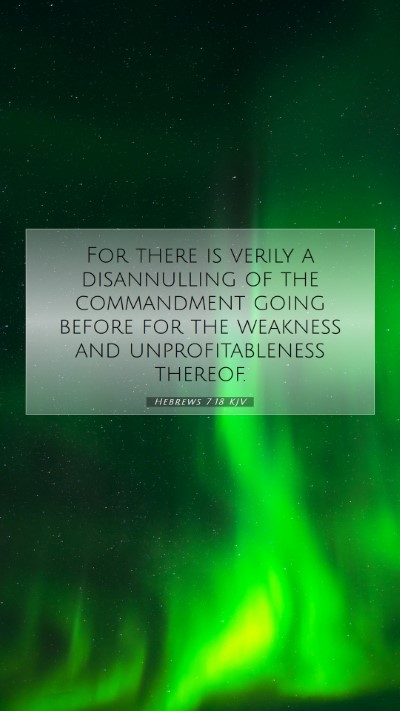Understanding Hebrews 7:18 - Bible Verse Commentary
Hebrews 7:18 states: "For there is a disannulling of the commandment going before for the weakness and unprofitableness thereof." This verse speaks to the transition from the Old Covenant to the New Covenant, emphasizing the inadequacies of the Levitical priesthood and the law that governed it.
Comprehensive Bible Verse Meanings
In the context of Hebrews 7:18, we see a direct reference to the former commandment concerning the Levitical priesthood and the Mosaic law. Let's explore its interpretation through the lenses of renowned public domain commentators.
-
Matthew Henry's Commentary:
Matthew Henry highlights that the previous commandment is deemed weak and unprofitable in administering spiritual matters. The law could not save; it only served to reveal sin. He explains that this serves as a precursor to the superior priesthood of Christ, where grace is abundant, and redemption is complete.
-
Albert Barnes' Notes:
Albert Barnes elaborates on the notion of "disannulling," suggesting that the old system of worship that relied heavily on the Levitical priests is abolished in favor of a more perfect system established by Christ. He emphasizes that Christ's priesthood fulfills and transcends the old, indicating that adherence to the law alone could not bring righteousness.
-
Adam Clarke's Commentary:
Adam Clarke notes the importance of understanding the context in which the epistle was written. He points out that the commandment was disannulled due to its inability to provide true spiritual sustenance and asserts that Christ's priesthood is not just a continuation but a complete transformation that fulfills the righteous requirements of the law in a new way.
Bible Verse Interpretations and Insights
The decision to disannul the previous commandment speaks to God’s initiative to provide His people with a more excellent way through Jesus Christ. The understanding of this verse is critical for anyone seeking deeper insights into Biblical theology and the nature of God's plan for salvation.
-
Spiritual Transition:
This verse signals a key transition in Scripture – from law to grace. The weakness of the law lay not in the law itself, but in human inability to fulfill it.
-
Christ's Superiority:
The superiority of Christ’s priesthood is underscored, making it essential for believers to grasp the significance of Jesus' role in the New Covenant.
-
Application to Daily Life:
Understanding this verse helps believers apply the principles of Christ’s sufficiency to their lives, encouraging reliance on Christ’s work rather than human effort for spiritual fulfillment.
Historical Context of Hebrews
The book of Hebrews was written to encourage Jewish Christians facing persecution. Understanding the tension between their former identity under the Mosaic Law and their new identity in Christ is pivotal. The author aims to clarify misconceptions and reinforce the supremacy of Christ.
Cross References
Hebrews 7:18 connects with several significant passages that enhance its meaning:
- Hebrews 7:11-12: Discussing the necessity of a change in the priesthood.
- Romans 8:3: Explaining the law’s inability to save due to the flesh.
- Galatians 3:24-25: Referencing the law as a tutor leading to Christ.
Conclusion: Importance of Understanding Scripture
As we grasp the meaning of Hebrews 7:18, it reflects the profound transition from an ineffective adherence to the law towards a new existence found in Christ. Through these insights from esteemed commentators, we develop a deeper appreciation for Scripture that enriches our Bible study experiences and guides us in applying biblical truths to our lives.


